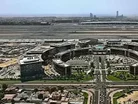Impressive results from DAFZA

The Dubai Airport Freezone Authority (DAFZA) has shared its 2015 financial results, achieving total revenue growth of 7 percent and total assets growth of 3 percent.
As a gateway connecting the emerging markets in Middle East and Africa, the Freezone grew its number of registered companies by 22 percent, with multinational companies in particular rising 9 percent as reflected by the growth of new sales revenue by 18 percent.
DAFZA witnessed higher demand for its office packages due to various factors, including sustained economic growth and the upcoming 2020 Dubai World Expo.
H.H. Sheikh Ahmed bin Saeed Al Maktoum, Chairman of DAFZA, said: “DAFZA is taking steady steps towards positioning itself as a main player and major driver for economic development and trade growth in Dubai, posting a strong performance and achieving significant growth at the operational level and among the focal sectors in the freezone. Last year’s buoyant financial results are testaments to DAFZA’s high potentials and competitive advantages which reflect its pivotal role in attracting foreign investments in the coming months.”
Follow @BusinessRevME



